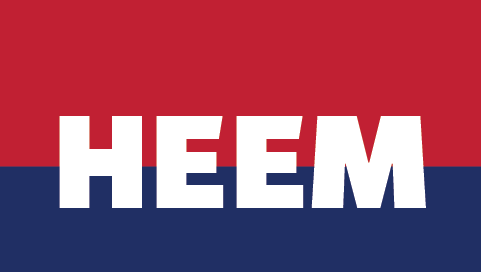Introducing Heem Publication and Emotional Debt
A Call to Strength and to Pay Down Emotional Debt

Heem is strength in Korean.
Heem Neh is slang for “be brave” or “be strong.”
When my dad would go to work early in the morning to beat L.A. traffic, my mom would tell him, “Heem Neh!”
When my mom would prepare Kimchi for a church picnic, I’d encourage her by shouting, “Heem Neh omma!”
Heem Neh is a call to action and that’s why I decided to name this publication Heem. It’s a call to be strong, to be courageous, and to find our strength together.
What is Strength?
Strength is:
knowing your limitations
knowing how to give and receive
continually bettering yourself
grit, perseverance, heart
Strength is ultimately knowing yourself.
Now strength isn’t something I discovered by crushing WOD’s at a CrossFit gym. It wasn’t something I discovered by pulling all-nighters to finish a project or by practicing for hours for my next viral TikTok video.
I discovered my strength when I made mental health a priority. Why?
Because mental health is the starting point for everything. It’s the starting point for my productivity, it’s the starting point for how I treat others, and it’s the starting point for how I treat myself.
For example when I’m really sad, I’m less productive. When I’m bitter, I’m overly sensitive to what people say. When I fail, I am my own worst critic.
Mental health is also deeply tied to emotions because they are powerful forces in our lives that need to be embraced and understood. If we don’t, we are left with unresolved emotional debt.
What is Emotional Debt?
Emotional debt is very similar to technical debt. Technical debt is what you’re left with when you choose a quick and easy fix as opposed to a better solution because it’s harder.
Technical debt isn’t inherently bad. Many companies accumulate it to ship products faster. But you will eventually have to pay it down i.e. put in the time to properly address the issue. When you don’t, it can build up fast making developing your project slower and creating more work later on.

If technical debt builds up enough, it can bring the whole project to a grinding halt forcing you face it head on. And paying down bad technical debt is a painful process:

But when you address technical debt, it can be incredibly beneficial. For example, a developer found a bug while addressing a company’s technical debt which resulted in $1 MM worth of missed invoices per year!
Emotional Debt works in a similar way with your mental health. Emotional debt is what you’re left with when you choose a quick and easy fix to something that’s negatively affecting you as opposed to putting in the work to deal with it properly.
Emotional Debt isn’t inherently bad. You can use it to get through the day. But if you don’t eventually pay it down, it’ll start to leak into your life whether you realize it or not.
Here’s an example. This is the normal amount of effort I need in order to do something like getting out of bed in the morning, writing an essay, or completing a project.

Now let’s say I found out that my pet fish Sparkie passed away last night and I’m devastated. I really loved Sparkie. This is the amount of effort I’ll need in order to complete the same job.

Notice that I have to put in more energy in the midst of my sadness. That’s because my mental health is my starting point (-20 instead of 0). Since I keep getting distracted thinking about Sparkie, I now have to put in more effort into focusing and reaching the finish line.
You Have a Choice
When you experience a powerful emotion like sadness, you have a choice.
You can choose to take a proactive approach and work through it. You can talk to friends, you can spend time processing, you can go for a run, you can talk to a therapist; do whatever works for you.
On the other hand, you can choose to build up unresolved emotional debt. You can try to ignore your sadness because dealing with it is too hard. You can keep the sadness inside because you don’t want others to think you’re weak.
But ignoring or cutting off the sadness doesn’t make it go away. Emotions have a sneaky way of leaking out into different areas of our lives because they’re so powerful. This is why you will have to pay it down eventually.
By prioritizing mental health, we can spend less time fighting ourselves and more time moving forward. This is what Heem Publication is about: a place to coach strength by managing emotional debt and learning how to pay it down when needed.
Subscribe to Heem
If you subscribe to Heem, this is the minimum of what you can expect:
A framework for approaching Emotional Debt
Anecdotes that touch on relationships, culture, faith, and most importantly our humanity
Coaching of tools and exercises that have worked for me
A community built to listen
Featured stories and questions from fellow subscribers
Exclusive content for paid subscribers (Coming Soon)
This is what you should NOT expect:
Therapeutic services
A complete exploration of a mental health topic and the many nuances behind it
That what works for me will always work for you
Share With Heem
Heem Publication is a community built to listen. Do you have a question or specific story of identifying emotions you’d like to share with your fellow subscribers in an upcoming newsletter? Share with Heem by clicking the button below!



